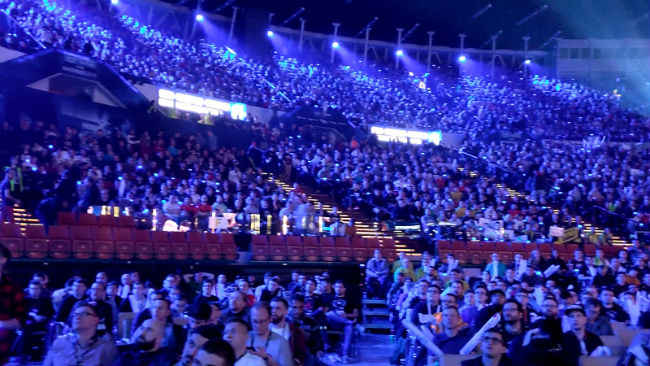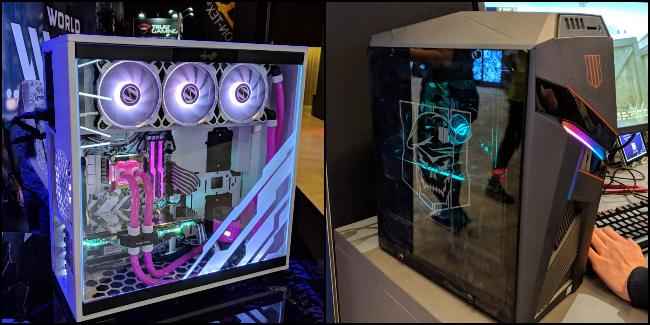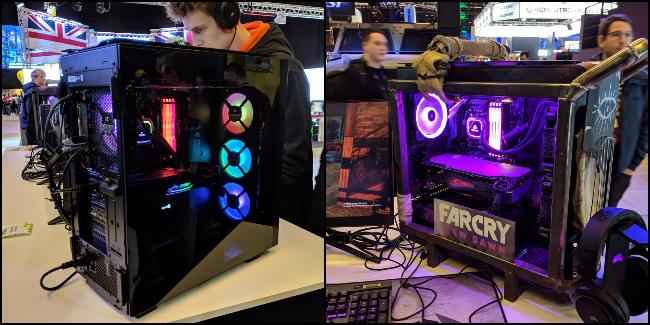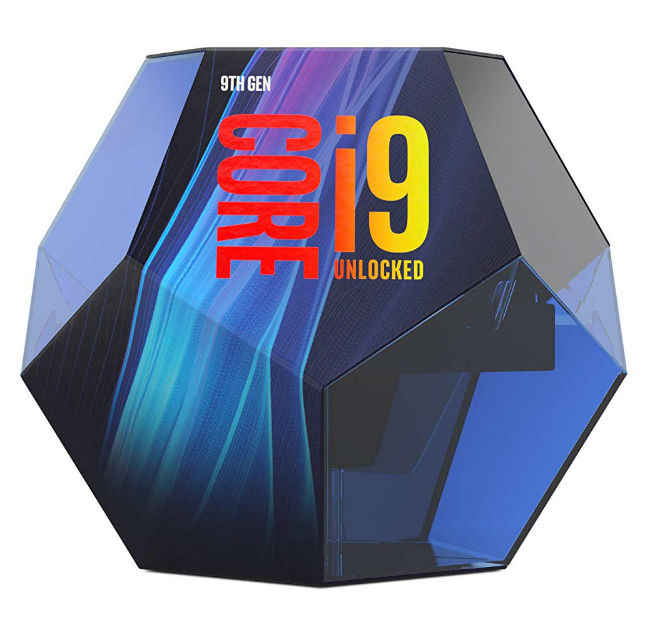Ready, Aim, Fire: Talking esports and evolving gaming tech with Intel
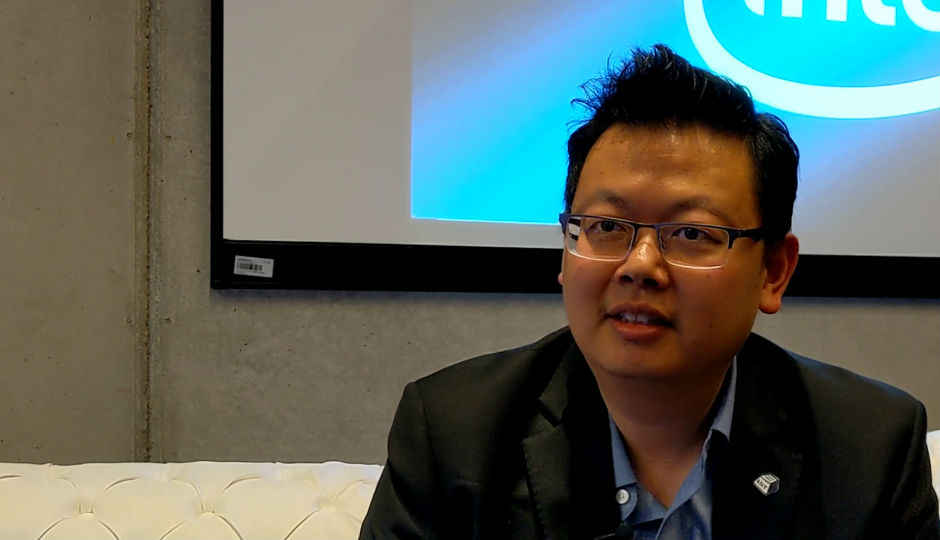
At the Intel Extreme Masters held in Katowice, Poland, we had a chance to sit down with Mark Chang and talk to him about the evolution of esports and how Intel has helped shape the new era of online gaming.
Ever since the two Johns created a little game called Doom, playing with friends online has been an engaging activity. But in the old days, you were limited to playing with friends that were in your local area network. To play a game on your PC with a friend, you needed to carry your computer to their house to enjoy multiplayer gaming. Not a small task considering the size of PC’s back then. How times have changed! Today, with the push of a button you can play with friends across the globe, chat with them live, and if you like “stream” your exploits on the world wide web for others to see and learn.
The evolution in this trend of online gaming has come with the growth and innovation in computing power. Having multiple apps working at the same time like a streaming app, the game you are playing, your webcam, and more are CPU intensive task.
One of the biggest changes that we have seen in gaming is with the growth of online competitive gaming where players not only enjoy celebrity status but also the pressures and training of a professional athlete. Online competitive gaming is a skill of reflexes, performance under pressure and above all, showing the other team who has the better trigger finger. At IEM Katowice, in Poland, we saw hundreds of thousands of fans cheering for their favourite player and team. Their scremas, cheers and chants were nothing short of exhilarating. The tension and excitement in the stadium was the same we have witnessed in an India-Pakistan cricket match. But instead of bats, balls and physical agility, these players are armed to the hilt in the virtual world with their fingers on state of the art hardware doing most of the talking. Not to mention the PCs these games were running on are the best that money can buy today.
IEM Katowice 2019 was house full!
Intel, the company that makes the hearts of these PCs has been involving with esports since the beginning of this phenomenon. And rightfully so. The company’s hardware has helped game developers push the limits of these games, build an infrastructure of competitive play and uphold the mantle of the PC master race!
Mark Chang, Head of Gaming Marketing at Intel tells me that Intel has been in the space of esports for over 15 years. Back then it wasn't even called esports. Intel gave those people who were passionate about gaming, a stage and an opportunity to compete. He tells me, “When we first started out we were probably in a room no bigger than this one (referring to our relative small interview room which could seat about 30 people) and now we are in some of the biggest stadiums in the world. There are a couple of different things that have happened along the way. From a tech standpoint, there has been infrastructure changes. Having broadband allows for people to compete against each other from regions around the world. Thats huge. So instead of having to haul your system to your friends house and only playing with your friends, you can actually test your skills with people around the world. Intel every single year is bringing technology that will help drive performance.”
An important aspect of the growth of the gaming industry has been risk taking. It was almost 5 years back when Intel decided to do a stadium event and Mark says that “people raised an eyebrow a little bit”. The biggest question and concern was whether people would actually come to such an event. The concern seems a little silly today considering the footfall we saw at IEM 2019, but when Intel was starting out with the stadium event, it was a genuine concern. Mark tell me that “It's being able to see the vision, take the risk, and continue to be committed and vested into it. Intel is unique in this space because it has been committed and invested in this for the past 15 years. It's been a passion project for us.” He even chuckles and says that the risk taking has paid off.
Some of the PC's from the IEM show floor
But Intel makes the little components that go into your computer. That one thing called the processor. Gaming, involves a lot more. You need RAM, a dedicated GPU, a motherboard that can handle the load, storage, and these are only the components that go into the case. If you need to show off there is a flashy case with lots of RGB. Then there is the medium with which you interact with your gaming beast. You have a keyboard, mouse, monitor, speakers or headphones. In the grand scheme of things, intel makes the heart of the machine but the appearance, personality and first impressions are left to the OEMs. Being the heart of the machine, Intel needs to keep its eyes on all the factors. Mark tell me that Intel looks at things in a holistic manner. It is really looking at the ecosystem. Apart from the OEM teams Intel has a team that works with software developers to optimise the software performance on Intel CPU’s. Intel works with OEMs to optimise their systems and help differentiate them.
Mark says, “Before you had a couple of option. You could build your own system or you could buy one. Now there are gaming systems from very affordable to a very high customizable range giving you the ability to play the way you want. We do a lot with the publishers and the leagues as well. We have the Overwatch league, Tencent, PUBG’s Bluehole, we take a holistic approach. Make sure there is enough hardware high performance, that can meet a lot of price points, and a lot of different needs. Whether its a notebook, or a desktop, we make sure the software is optimized to take advantage of the tech thats growing and also working with the leagues to take those chances. Intel does not take a passive approach. We are active partners in each step of the process.”
Talking about PUBG, an interesting question popped up in my mind. In the early days of online and competitive gaming, there were only a few games that exploited these platforms. We had Doom, Quake, League of Legends, and Counter Strike to name a few. But today, the number of games that demand cooperative and competitive play online are being churned out each month. I asked Mark if these games needed time to breathe. To have enough time between two homogenous games launching so that it could be established if one was esports worthy or whether it needed improvement. With the launch of PUBG, Fortune and Apex happening in less than a year’s time are we seeing a market that will get too saturated to fast? Mark had an interesting take on this. He tells me that this is in fact the most exciting time in gaming. A lot of options is actually good. The lifespan of a game depends on a lot of factors. Not every game that's competitive needs to reach the highest echelons of esports. Some of it is perfect for the every person competition. It is easy to pick up so that more people can play it. Some of it may be good for casual players to get a hang of. Some of it requires more skill to grow higher. It also depends on the support of the publisher and the ecosystem. Whether a game makes it or doesnt, it depends on the community.
Since so many games are gunning for your attention, they are bound to put their best foot forward. Mark tells me, “Competition is good. It allows a publisher to be mindful and be able to design games that are meeting the needs of the competitive player. Giving more competition allows them to get better with every iteration or every patch”.
Looking into the future of gaming I asked Mark where he sees the future of gaming from an esports and Intel perspective. What’s his take on the game streaming era we live in. Mark says, “Our tagline is game, record, stream without compromise on intel core i7. You need a core i7 or core i9 to make that happen. You want to play the games at the highest settings. You cannot have dips in your framerate otherwise that is going to affect your experience. There are two other workloads, recording and streaming. That's essential for you to be a part of the community. All of those have to operate at the same time at a high level otherwise your overall experience degregates”. There is one thing about streaming and recording gameplay which he said that is the bitter truth of life. He said, that if the streams and recordings are not of good quality, then no one wants to watch. Just so you know, recording and streaming are CPU intensive workloads. So having a good CPU is key if you are one looking to stream or record gameplay.
Mark also talks about other technologies, he says, “As for some of the new technology, there is cloud and there is AI. We actually have teams within our server side that actually are working on solutions for that. Having 5G will democratize the ability for people to play anywhere. If you can't get broadband today perhaps that (5G) can be a solution”.
When Mark said play anywhere, a Microsoft initiative hit my mind. You can play your Xbox Exclusive game on day one on a PC or an Xbox console. Your save games work across both platforms. So you can start playing Gears of War on your Xbox at home and pick up right where you left off on your gaming laptop if you are on the go. Talking about a platform agnostic future I asked Mark if Intel was prepared for something like this. A future where you can play your games on any device. He told me play anywhere along with could gaming seems to be the trend along with cross platform play. He says that with this, players get to choose their experience. He says players get to choose what they want to show up with. “The PC is the most versatile and has the best peak performance. It all comes down to what is valuable to you” he says.
Overall the birth and growth of broadband internet coupled with great technological innovations is the reason we have gaming at a grand scale across the world. But how about a market like India where the experience of high speed internet is just beginning. People are only now getting to experience high speed internet at affordable prices. How does Intel look at such a market that is just getting exposed to the world of competitive gaming and streaming. With a broad smile Mark tells me that emerging markets have a lot of pent up demand. He tells me about the upcoming ESL event in Mumbai which takes place from the 16 to the 21 of April 2019. He says this could be the biggest esports event in the history of the country and “we would love for it to be that” he says. He says this is the opportunity to create local heroes from India who could rise up to the global scene. He tells me that this has happened in other markets. Being a hero in esports is a dream worth having and one that isn't impossible to achieve.
Just like any other activity one needs practice, patience and perseverance to become the next hero standing on stage holding a trophy and a large cheque watching the world chant his/her name. The reality of today is, this position isn’t reserved for the athletes of traditional sports but of the ones who can prove their reflexes and talents on a device used otherwise to write this article.
Intel is giving players a platform to prove their skills to the world. The world is giving us gamers who can teach us how to make our game better. Whatever your platform of choice, whether PC or console or mobile, it is a spectacular feeling hearing your name being cheered while you play a competitive game on stage. The future of gaming is bright, the future of competitive gaming brighter. It’s like Mark said, this is the best time to be a gamer.
Also Read:
Interview: Alienware Co-Founder Frank Azor tells us how 'The Game' has changed
Here's how Indian PUBG gamers are streaming their way to the bank
Crackdown 3 Review: Old school gameplay in the new age
Sameer Mitha
Sameer Mitha lives for gaming and technology is his muse. When he isn’t busy playing with gadgets or video games he delves into the world of fantasy novels. View Full Profile


